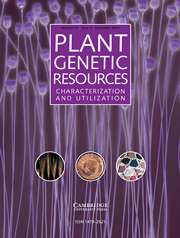No CrossRef data available.
Article contents
Association of microsatellite markers with root architecture and agromorphologic traits in diverse germplasm of bread wheat
Published online by Cambridge University Press: 02 December 2020
Abstract
Bread wheat (Triticum aestivum) is one of the most important food crops in the world. Its physiological and morphological traits are closely related to yield. Therefore, it is generally important to discover the genomic region associated with these traits. In this research, associations between 21 simple sequence repeat (SSR) markers and 10 inter-simple sequence repeat (ISSR) markers with some traits related to root structure at the embryonic and seedling stages and also some agromorphological traits at the whole plant stage were evaluated on a set of 102 wheat genotypes. A highly significant coefficient of variation among different genotypes was observed in all measured traits. A high level of polymorphism with SSR and ISSR markers was obtained. Genetic structure analysis revealed two distinct subpopulations. Significant correlations were found between genomic markers and evaluated traits. A total of nine markers, including four SSR markers in 1A, 3A, 5A and 2B chromosomal regions and five different ISSR markers were related to the studied traits. Several molecular markers were significantly associated with more than one phenotypic trait, suggesting the possible presence of pleiotropic or indirect effects. The phenotypic variation justified by these alleles ranged from 4 to 15%. Obtained genetic information can be targeted for further validation and genetic analysis in the relevant populations or other breeding sets.
- Type
- Research Article
- Information
- Copyright
- Copyright © The Author(s), 2020. Published by Cambridge University Press on behalf of NIAB


